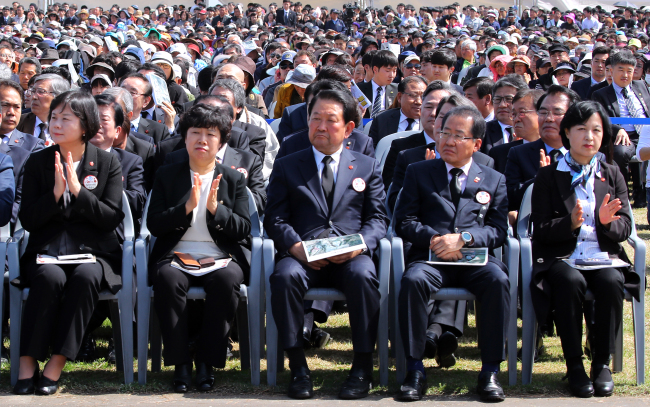Political parties on Tuesday commemorated the 70th anniversary of a bloody government-civilian clash on the southern island of Jeju, with their views on the tragedy split across ideological lines.
The Jeju April 3 incident is a government-civilian clash from 1948-1954, an outgrowth of Korea's ideological division following its 1945 liberation from Japan's colonial rule. A 2003 government report put the number of civilian deaths at between 25,000 and 30,000, about 10 percent of the island's population at the time.
The liberal ruling Democratic Party noted that the victims in the incident "suffered from state power," in sync with the government's position that the tragedy resulted from the then-government's use of violence against innocent civilians.
"The Jeju incident is (a part of) the Republic of Korea's history that all citizens must remember," Kang Hoon-sik, the party's spokesman, told reporters. "We offer words of solace to Jeju islanders who had long suffered from (the abuse of state) power."
 |
(Yonhap) |
By contrast, the conservative main opposition Liberty Korea Party highlighted that the incident started with an "armed revolt"
staged by a group of communists, called the Workers' Party of South Korea.
"The party took residents in a mountainous region (of the island) as shields and staged guerrilla warfare, with forces against it carrying out a strong crackdown in response, which caused damage to Jeju civilians," Chang Je-won, the party's spokesman, said.
Some rightists had cast the government crackdown as part of a campaign to exterminate communist sympathizers. The claim had gained weight in the decades after the end of the incident in 1954, as then authoritarian leaders carried out an anti-communist movement.
The centrist Bareunmirae Party, meanwhile, vowed to uphold the spirits of the Jeju "movement" so as to foster national unity.
"The spirit of our party's foundation is to go beyond ideologies to achieve national unity," Yoo Eui-dong, the party's spokesman, said.
"We pledge to do our best to help verify the truths behind the incident and restore the honor of the victims and bereaved families," he added.
The minor liberal Party for Democracy and Peace compared the Jeju incident to the Holocaust, pledging to join the efforts toward a "complete resolution" of the incident.
"We mourn the victims who were sacrificed by state power and offer our words of solace to the bereaved families," Choi Gyung-hwan, the party's spokesman, said. "We also respect the Jeju citizens who have tried to promote reconciliation and peace despite the painful part of history." (Yonhap)








